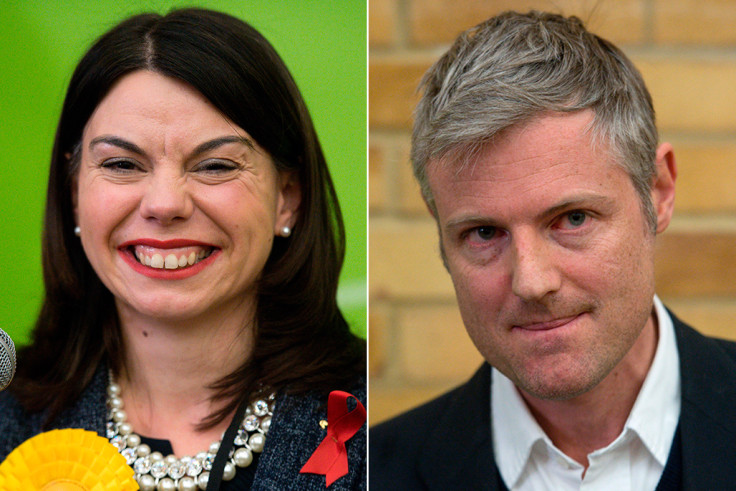Richmond Park by-election shows May's Brexit strategy is leading the UK over a cliff
There is massive opposition to a third runway at Heathrow in Richmond, but far greater concern about Brexit.
If airport expansion is a tough issue for a Prime Minister, Brexit is even tougher. Credit to Theresa May for at least making a decision on the third runway at Heathrow, an issue that has been rumbling around Westminster and Whitehall for years. No credit at all for the woeful handling of the far bigger, far more complicated, far more significant issue of the UK leaving the European Union.
The reaction from Downing Street is that the result of the Richmond by-election changes nothing. Maybe. But at least, surely, the message is worth digesting. It is that, in an area where there is massive opposition to the third runway at nearby Heathrow, there is far greater concern that the government's Brexit strategy is leading the country and its economy over a cliff.
The voters of Richmond can now join High Court judges as enemies of the people in the eyes of those who seek to pretend that the entire country is determined to bring about the hard Brexit favoured by the Brextremists in key positions in government, and their cheerleaders in the Brexit Lie Machine newspapers.
But May would be wise to learn the art of subtlety in handing difficult, divisive issues. 'The result changes nothing' smacks a little of the soundbite which defined the early part of her Premiership, 'Brexit means Brexit.'
Bearing in mind the word, like 'post-truth', did not exist until recently, it will take a while to define exactly what Brexit does mean, but the seeming clarity of her BMB mantra is not matched by the words and deeds of her and the ministers who are allegedly in charge of the process of taking us out of the EU.
To supplement the BMB approach, we have consistently been told that the British people 'gave us a clear message.' But they didn't. They voted to leave the EU. They did not give a clear message about what they wanted that to mean. They did not, despite the claims of the Brextremists, vote to leave the single market, for example.
What is more, the 48% who voted to Remain, did not vote to be forgotten in the process. They are still there, and they are entitled to be heard. The Richmond result was a reminder of that.
It is perhaps understandable, having become PM on the back of her predecessor's ill-advised and then botched referendum, that May, nominally a Remainer, leaned to the Leave side of the argument on taking office. But following a referendum which exposed just how divided we are, she seemed not to see the importance of seeking to unify the country.
Just as David Cameron stumbled into the referendum to silence the noise of Ukip and the Tory Right, so May became the latest Tory leader to allow policy and positioning to be dictated by internal Conservative Party politics as much as the national interest. Hence the meat of a deadline for triggering Article 50 – a major card, played too early – at her Party conference.
With so many pro-Brexit newspapers banging the drum so loudly, and with Nigel Farage perhaps the most high profile allegedly retiring leader on the planet, the noise has certainly been loud. But the job of leaders is to cut through it and make sense of the arguments. There is little sign of her doing either.

'No running commentary' followed BMB as her soundbite of choice. But this is unsustainable in a negotiation as complex as the one she is now engaged in.
In the strategy vacuum that appears to exist, is it any wonder that a few scribbles on a Special Advisor's notepad, or the latest blurted out nonsense from the mouth of Boris Johnson breaking bread with EU Ambassadors, fill the gap?
Everyone understands that a lot of the detailed work has to be done in secret, and positions kept from those we will be negotiating with.
But it is perfectly possible to set out strategic brush strokes in public, and fine tune the detail in private. Watching and listening to May, Johnson, David Davis and (when he is allowed to speak) Liam Fox, does anyone really have any sense of the big strategy? And is that a good thing or a bad thing? No, and bad, would be my answers to that.
The Lib Dems would be wise not to overstate the significance of one admittedly dramatic by-election result. But at least there has been a clarity to their position. There has been no clarity to the government's, which is why Number 10 keep having to dismiss the remarks of senior ministers as 'personal views' (ridiculous).
Labour likewise have been sending confused messages, with Brexit spokesman Keir Starmer sensibly trying to keep options open (why wouldn't you when the situation is so fluid?) and shadow chancellor John McDonnell undercutting him with his own version of BMB.
It is not easy for any of them, and hardest of all for May. But unless she brings a little more finesse and subtlety to her handling of this, Richmond will not be the last of the Friday morning shocks to their system. More importantly, the other Remainers – the leaders of the other EU countries and the hated (sic) bureaucrats in Brussels – will run rings round May and her team once the negotiations proper get under way.

Alastair Campbell is a British journalist, broadcaster, political aide and author, best known for his work as Director of Communications and Strategy for Prime Minister Tony Blair between 1997 and 2003. He is the author of 12 books, the latest of which is Outside Inside, his diaries from 2003-2005.
© Copyright IBTimes 2025. All rights reserved.






















